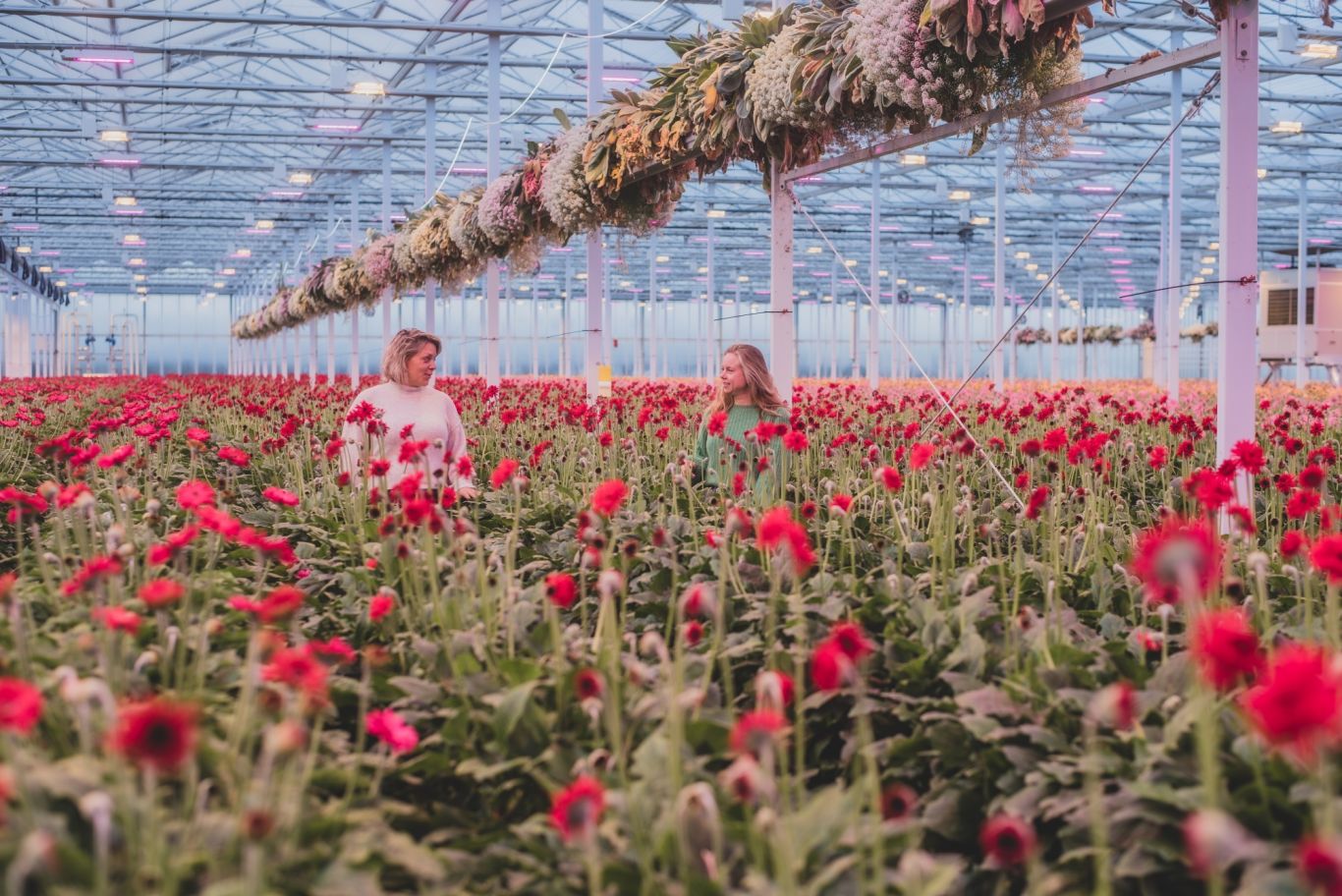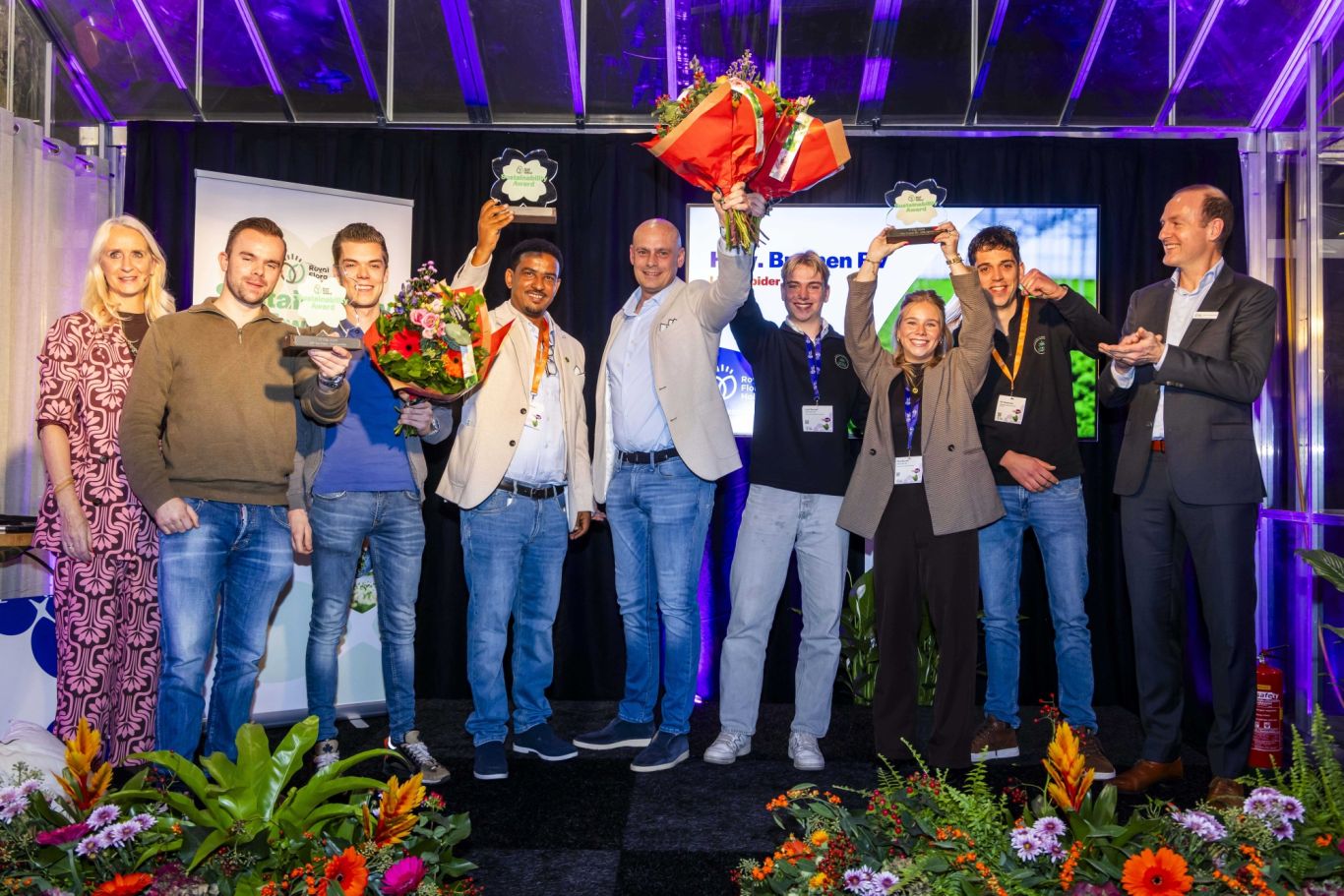Impact maker LG Flowers: from exciting experiments to sustainable innovations
November 25, 2025

The LG Flowers farm in South Holland has four greenhouses. All of them are filled with mini gerberas in various colours and shapes. One greenhouse is particularly special, as it is used for extensive experimentation, including pesticide-free cultivation. Nouschka van der Burg (LG Flowers): ‘With one specific variety, we managed to grow greenery for 18 months without using herbicides or insecticides. That has whetted our appetite for more.’
LG Flowers is a true family business. The third generation is now at the helm: brother and sister Mike and Joyce Lansbergen. Joyce (director of LG Flowers, left in the photo) in particular regularly speaks and writes about innovation and sustainability in floriculture in general, and her company in particular. But that passion for innovation, Joyce says, has always been part of LG Flowers. ‘Grandpa and Grandma Lansbergen, and later my father and uncles, were already working on it. Take, for example, our rainwater irrigation system and its recirculation. We've been doing this for thirty years. Here in the company, it's quite normal.’
‘Sustainability and business profitability must go hand in hand: otherwise, you can't bring about change.’ - Joyce Lansbergen | LG Flowers
Treating the earth with care and respect
The motivation to become more sustainable is deeply rooted in the company's mission. It is the only way to remain relevant in the future, explains Nouschka. For LG Flowers, it is crystal clear: sustainability and a financially healthy business go hand in hand. Only from a healthy business can you commit to a sustainable transition with full attention and for the longer term. And you can free up resources for investments in a sustainable future that may not pay off immediately.
Nouschka: ‘For us, a green barberton daisy has three pillars: lower footprint, green cultivation and innovation with high-tech resources.’ The most recent investment for a lower footprint is the enormous battery that LG Flowers recently installed. Switch on the CHP for one hour and the battery is fully charged for use in the test greenhouse. Nouschka: "We have all the resources in-house to use the smartest mix of gas and electricity and thus reduce our footprint. What's more, we are ready to switch to CO2-neutral and gas-free growing as soon as it is financially feasible.
On the cultivation side, LG Flowers has become much greener in recent years. The company recognises that working with pesticides is not sustainable in the long term. ‘We already didn't use herbicides because we grow in greenhouses. But we did use insecticides,’ says Joyce. With a specific type of gerbera in the test greenhouse, they managed to grow insecticide-free for a year and a half. ‘Last year, we had problems with leaf miners, which slowed down the growth of the plants. But the pest pressure was not high at the time, and we could cope with the slightly lower production. So we decided not to use chemicals.’
This year was different. Because LG Flowers' largest greenhouse was undergoing major renovation and producing fewer flowers, every flower had to be sold. The pest pressure from leaf miners was also greater this year. If you don't take action, Joyce explains, you get another, additional pest. And that is almost impossible to get rid of, even with chemicals. ‘Whether or not to use chemicals was a consideration. What can we handle in terms of business operations, and what are the consequences of taking action or not?’ LG Flowers learns lessons from all these considerations. For example: this year, we had to use chemical control. But what can we learn from this to prevent excessive leaf miner infestation in the greenhouse next year? ‘We transfer the most successful experiments from the test garden to the other greenhouses as quickly as possible.’
In addition, since this summer, six cameras have been helping to scout for diseases and pests. The cameras use artificial intelligence (AI). The AI cameras take a photo of every flower and the AI programme scans them for abnormalities. In this way, the cameras detect diseases or pests even earlier than the human node can. In this way, high-tech innovation helps to make cultivation greener. Nouschka: ‘We are aiming for a combination of high-tech and organic growing. This allows us to grow in the most sustainable way possible. We firmly believe in this.’
‘At the end of the day, the game of sustainability makes growing much more enjoyable.’ - Nouschka van der Burg | LG Flowers
Innovating with the whole team
Stopping chemical control can be exciting. Will it work out and what is your plan B if things turn out differently? Joyce: ‘It is exciting, of course. But that's part of entrepreneurship.’ What helps is that LG Flowers employs a young cultivation specialist who joined the company specifically to help make cultivation greener. Nouschka: ‘He travels from Amersfoort to Pijnacker every day with that goal in mind: to make floriculture more sustainable.’ Nevertheless, the excitement remains. During the pilot, even this specialist regularly broke out in a sweat wondering how decisions would turn out: would it go well? Nouschka: "And yet, at the end of the day, this makes cultivation much more enjoyable for him and his team. The team is now thinking about how to tackle this pest. It's a game. That's very different from the past. Back then, it was more like: we have pest X, so we intervene with agent Y.‘ Joyce: ’Now it has become a wonderful challenge that they are working on together. And if it succeeds, it's something we can all be proud of. That creates a completely different dynamic."
Nouschka has clear advice for growers who are considering becoming more sustainable: just get started. "You don't have to completely overhaul your farm right away. Start with small adjustments in a separate greenhouse or in a screened-off part of the greenhouse, and learn from this so you can continue to expand. And don't expect to know exactly what the outcome will be in advance, but leave room for unexpected results," she says. And finally: know that you don't have to do it alone. ‘If you don't have the expertise in-house, call in a specialist. That's what we do. Sometimes just to bounce ideas off each other or refine a plan. Talking to someone else always helps you move forward in this variety of areas.’
Do you have questions about this specific sustainability measure or do you have your own sustainability plans? Please contact sustainability@royalfloraholland.com.
Impactmakers is a series by Royal FloraHolland that highlights entrepreneurs who are making the sector more sustainable with vision and courage. From big steps to small improvements: together we are building a future in which flowers and plants are grown with respect for people and the environment. LG Flowers is an inspiring example of this. Discover all stories from our Impactmakers.
-
Did you find this interesting?
Then share this article

